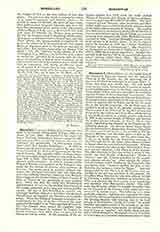

Merneptah I (1234?-1214 B.C.), the fourth king of the nineteenth Egyptian dynasty and the supposed Pharaoh of the Exodus, was the thirteenth son of Rameses II whom he succeeded in or about 1234 B.C., being then long past middle age. His rule lasted some twenty years, during which he carried on considerable building operations in the Delta, and notably at Tanis (Zoan), where, indeed as elsewhere, he usurped a number of some of his predecessors’ monuments. His original works are comparatively few and insignificant. His name is constantly found on the monuments of his father; it appears also in Nubia, and in the old quarries in the Sinaitic peninsula. In his third year, he quelled a revolt to the N. E., possibly excited by the Hittites; and in his fifth year, he repelled an invasion of Egypt by the Lybians and their allies, which victory is boastfully described on a black granite stela found in 1896 in his funeral temple at Thebes, and bearing the earliest known reference to Israel. He is commonly regarded as the Pharaoh of the Exodus on the following grounds. On the one hand, recent Egyptian discoveries have shown that Rameses II founded the cities represented in Ex., i, 11, as built by the oppressed Hebrews, and therefore point to him as the Pharaoh of the oppression. On the other hand, Ex., ii, 23; iv, 19, imply that the immediate successor of that Pharaoh was on the throne when Moses returned to Egypt where he soon delivered his people. Whence it is not unnaturally inferred that Merneptah I, Rameses’ son and successor, is the Pharaoh of the Exodus. The chief objection to this view is that it seems to contradict the final strophe of Merneptah’s “Hymn of Victory” over the Lybians inscribed on the granite stela already referred to. After relating the subjection of Clianaan and of Ascalon by the Egyptians, this inscription adds: “Israel is spoiled, his seed is not; Palestine has become a widow for Egypt.” How can Merneptah I be the Pharaoh of the Exodus since according to the obvious meaning of this passage, the Israelites when defeated by him were already settled in Palestine, a settlement which as we know from the Bible was effected only after a forty years’ wandering and therefore after Merneptah’s death? This difficulty has led many scholars to consider an earlier king as the Pharaoh of the Exodus, while others have answered it in various ways. The following is its most probable solution. Scholars not expecting the exact truth to be told in an Egyptian inscription concerning the Exodus disaster, and noticing that in the final strophe of Merneptah’s “Hymn of Victory” an actual boastful misrepresentation of his relation to the Hittittes, precedes almost immediately the distinct reference to Israel as “spoiled”, will readily think that the glory therein claimed by Merneptah over the Israelites is to be taken as a boastful misrepresentation of what really happened to him as the Pharaoh of the Exodus. Merneptah’s mummy was discovered in 1896 and identified in 1900. This find does not disprove the identity of that monarch with the Pharaoh of the Exodus, for nothing in the Sacred Text requires the admission that Pharaoh pursued the Israelites in person, or was drowned as a result.
FRANCIS E. GIGOT

